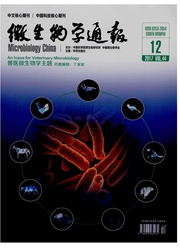

 中文摘要:
中文摘要:
【目的】以柚皮为原料,优化棘孢曲霉利用柑橘加工副产物固态发酵柚苷酶的条件。【方法】采用高效液相色谱法检测酶活力,通过单因素试验考察固水比、装样量、接种量、温度对柚苷酶发酵的影响,用正交试验优化发酵条件。【结果】单因素试验结果的显著性分析表明培养基的固水比、装样量和培养温度对柚苷酶产量有显著性影响,而接种量影响不显著;经正交试验确定的优化条件是:固水比1:1(质量体积比),装样量5 g/250 m L三角瓶,温度为30°C,接种1 m L孢子悬浮液,发酵8 d。在此优化条件下,柚苷酶酶活力为8.19 IU/g干物质,比初始培养基产柚苷酶活力提高7.38倍。【结论】通过对固水比、装样量和发酵温度进行优化,大幅度提高了棘孢曲霉固态发酵柑橘加工副产物的柚苷酶产量,为柚苷酶的生产提供了一种高产发酵工艺。
 英文摘要:
英文摘要:
[Objective] The study aims to optimize solid-state fermentation conditions of citrus processing by-products with Aspergillus aculeatus for naringinase production. [Methods] The naringinase activity was detected by a high performance liquid chromatography method. The effects of solid water ratio, loaded sample, inoculation quantity and culture temperature were investigated on producing naringinase by single factor experiments and the fermentation conditions were further optimized with 3 factors at 3 levels in an orthogonal experimental design. [Results] Single factor experiments showed that solid water ratio, loaded sample and culture temperature had significant effects on the yield of naringinase, while inoculation quantity has no significant effect. The optimized fermentation conditions for A. aculeatus are: solid water ratio of 1:1 (W/V), loaded sample of 5 g/250 mL triangular flask, inoculation quantity of 1 mL at 30 ℃ for 8 days. Under optimal culture conditions, the activity of naringinase reached 8.19 IU/g dry substrate, which was 7.38-fold higher than that achieved before optimization. [Conclusion] There is significant improvement in naringinase production in pomelo peel solid-state fermentation by A. aculeatus after optimization. This study established a high-efficiency fermentation process for naringinase production.
 同期刊论文项目
同期刊论文项目
 同项目期刊论文
同项目期刊论文
 期刊信息
期刊信息
